Zarik Read online
Zarik
Conquered World: Book Twelve
Elin Wyn
Contents
Miri
Zarik
Miri
Zarik
Miri
Zarik
Miri
Zarik
Miri
Zarik
Miri
Zarik
Miri
Zarik
Miri
Zarik
Miri
Zarik
Miri
Zarik
Miri
Zarik
Miri
Zarik
Miri
Zarik
Miri
Zarik
Miri
Zarik
Miri
Zarik
Epilogue: Miri
Letter from Elin
Sk’lar: Sneak Peek
Please don't forget to leave a review!
Don’t Miss the Star Breed!
About the Author
Miri
“The toxin will be even stronger than what those bastards have been using on us,” I heard someone say.
I thrashed. The shadows in the blackness shifted. My body exploded with pain. Against my cheek was something sharp, maybe even spiky, but not at all durable. A crunching noise penetrated that awful ringing. An earthy smell invaded my senses.
The ringing sound began to dull, but it was replaced by an equally awful rushing in my ears. Something brushed against my cheek. My face twitched. Even that ached. My eyelids fluttered painfully.
I realized I wasn’t in a sea of blackness at all. My eyes were closed to protect themselves from the blinding white light that surrounded me. At least I could trust my body to look after itself when I clearly couldn’t.
Slowly, I opened my eyes. It was a slow and painful process.
Why did I hurt so much?
The white light was blinding at first, but, as my eyes adjusted, I began to see distinct shapes within the blaze. Pale greens and yellows. A few scratching blinks revealed those shapes to be leaves and branches. I was in the forest.
What was I doing in the forest?
I tried to think back to what happened before I woke up here. Panic seized me when I searched for memories but found nothing but emptiness. It was as if I hadn’t existed before this very moment.
I sucked a shuddering, dust-filled breath into my lungs. The air burned my throat. Coughs rattled my body so hard I feared my ribs would break.
Water. I needed water.
I gasped softly. I remembered what water was. That was something. Not much, but it was a sign that my mind wasn’t completely blank.
As I lay there, I took inventory of the things I knew for certain. I was in a forest. There was dirt and dead leaves beneath me. Branches and verdant leaves above me. I assumed there were rocks and roots as well.
I needed to see more, see what else I remembered. I sucked in another breath and willed my body to work. Sharp, brittle leaves dug into my palms as I pushed myself up. Every joint and muscle cried out in protest.
Nausea rolled through me. The hollowness in my stomach told me there was nothing to retch up even if I’d wanted to.
My arms trembled under the weight of my upper body. I still couldn’t get my legs to move.
I told myself my situation wasn’t as dire as it had been a moment ago. I could see, I could breathe. My movement was limited, but at least I could move.
It occurred to me that I might have a broken bone somewhere. Ah, I could add bones to my list. And blood.
I breathed a small sigh of relief. Things were coming back to me. I just had to think about them for a moment. With great effort, I rolled myself onto my back and supported my upper body with my forearms. They ached and trembled, but I now had a better vantage point of the world around me.
I looked at my legs. I was wearing pants, a thick, durable fabric with a choppy pattern that looked like it was modeled after the forest floor. There was an insignia on one of the side pockets, but I didn’t recognize it.
Covering my torso was a different fabric, still durable, but lighter in weight. It was deep blue. Another insignia was sewn into the sleeve. I didn’t recognize that one either. The boots on my feet were scuffed from use and worn in certain spots.
Looking at the articles of clothing I wore, I didn’t think they belonged to me. Just by looking at them, I could tell they didn’t fit right.
The pants were too big. The shirt was tight around my shoulders. The boots looked big to me, but I wouldn’t be able to tell for certain until I got up and moved around. Who knew when that would be?
Not I.
I slowly rotated one foot, testing for pain. There was muscle soreness, but nothing unbearable. I rotated the other foot with the same results.
Ankle, muscle, sprain. I knew what those words meant.
I bent my legs at the knee and tried to push my weight onto my heels, but my body wasn’t ready to cooperate. It was worn out. I looked around for a good place to rest. I didn’t fancy lying back down on the forest floor.
Nearby was a thick tree trunk covered in soft-looking moss that looked ideal. Relying on my arms more than anything, I pulled myself over to the tree trunk. I sat with my back against the moss. It wasn’t as soft as it looked, but it stopped the jagged tree bark from cutting into my sore back.
“Okay,” I sighed and sharply drew in a breath. My own voice caught me off guard. I forgot I could speak. My throat was dry and scratchy, but I tried to speak again. “Let’s try to think about this.”
All around me was the forest. It would’ve been too lucky if there was some kind of sign nearby. But if there had been a sign, would I have been able to read it? Would I recognize the name?
My mouth dropped open in horror as I came to a realization. Could I remember my own name?
No.
What was I going to do if I didn’t know my own name? No one would be able to help me if I couldn’t tell them who I was.
I closed my eyes. Shutting out the world around me might help me think.
I pictured my own face, an initially difficult task. I knew my hair was dark. I had the strange sense that it was long, but when I reached up and touched it, I found it cropped at the chin. I moved on to the shape of my face. My cheeks felt gaunt. My lips were dry but full in shape. My nose was straight and unremarkable.
I couldn’t remember what color my eyes were.
A sea of faces that might’ve had my features swam through my mind. I flipped through them like an old picture book. A memory slipped in between the fabricated faces. A reflection in a cracked mirror. It was me. I looked scared. The rest of the memory fragments clicked into place. I’d just broken the mirror by accident. The mirror was important for some reason. Perhaps it was very old. My mother was going to be furious when she found out.
“Miri!” The voice in the memory shouted just before the memory faded away completely.
Miri.
That was my name.
Probably.
“Miri.” I tested the syllables as if that would give me some kind of confirmation.
What now?
I remembered the forest as a vast and dangerous place. I assumed the odds of someone stumbling across me here were slim. I stood a better chance if I somehow figured out where I was and going from there.
I closed my eyes again, hoping to call up another useful half-memory. I saw flashes of a city street. For a split second, I smelled fried johnnycakes from a street vendor. I squeezed my eyes shut tighter in an attempt to bring the memory into clearer focus.
I saw the wrinkled face of the street vendor. He smiled and thrust a johnnycake into my unexpecting hands. I tried to give him money, but he refused.
The johnnycake was
sweeter than I expected. The vendor must’ve glazed it with honey.
This memory was pleasant, but not helpful. It faded away like smoke before I could think of anything useful. Surely I knew the name of that city. I clearly knew the street vendor.
A name struggled to take form on my lips.
Kluster. No, that wasn’t right. Kanter. No.
Kaster.
The name clicked into place with the memory. That street vendor was from Kaster. Was I from Kaster?
I tried to dig up another memory, but nothing came up. All I knew for sure was that at some point, I’d made friends with a street vendor in Kaster. But where was Kaster?
I squeezed my eyes shut and concentrated until pressure throbbed between my eyes. Looking for my locked memories felt like trying to empty an ocean with a cracked bucket.
Another name surfaced after some time.
Duvest. I was pretty sure it was another city. Was it near Kaster? More importantly, was I near either of those places? Even if my memory was perfectly intact, figuring out where I was would be a challenge. Nothing in my surroundings gave me a clue.
With a long, tired sigh, I let my head rest against the tree trunk. I decided I wasn’t going to worry about where I was right now. Until I started to remember more, there wasn’t much I could do. Besides, my body was exhausted. Whatever had happened to me had taken a serious toll.
Perhaps I simply needed some sleep. My eyelids were already drooping.
Yes, just a few moments of sleep and I would wake up feeling much better.
Right?
Zarik
Do you know what one of the biggest benefits is to essentially being invisible?
You basically get to do what you want without getting into too much trouble for it.
The other big benefit?
People say things around you they normally wouldn’t because they don’t remember or notice that you’re there.
In my case, being invisible had its advantages before the Vengeance was destroyed. I used to collect things, things that most of the rest of the crew thought were unusual, disgusting, or downright weird.
And that was fine. I enjoyed my collection, and my solitude. It wasn’t like I had earned or deserved people’s attention.
Now, before the ship blew up, I was Zarik—second engineer. Rouhr had brought me on board and given me an opportunity to prove myself and regain my honor.
Another one of the benefits of no one ever paying attention to you was that you generally heard many things that wouldn’t normally be said while you were around.
Such as—today, when I had been walking behind General Rouhr, Strike Team Commander Karzin, Strike Team Commander Sk’lar, and two of the human guards, they were speaking of a woman that had come in earlier that day, distressed about her missing daughter.
Curious, I followed Karzin and Sk’lar as they headed out to the room where the woman was, ready to file a missing person report.
With a datapad in his hand, Karzin looked more bored than interested in the whole situation.
“Mind if I join you?” I asked them right before we stepped inside the cramped interrogation room. Sk’lar looked back at me over his shoulder, eyebrows shooting up as if only now he was realizing I had been following him, and exchanged a glance with Karzin before shrugging.
“Suit yourself,” he said. “This is probably nothing.”
Following him, I stepped inside the room and took a seat across from the middle-aged woman. She had deep wrinkles around her eyes, wrinkles that seemed even deeper in her distress, and a few streaks of white hair had already started to take over her brown hair. In a room that was nothing but three bare walls and a one-way mirror, she looked even smaller in stature than she really was.
“Finally,” she cried, nervously running her tongue over her lips. “I’ve been waiting here for almost an hour.”
“I’m sorry, ma’am,” Karzin said, his tone polite. “Busy day.”
“I understand that, but I’d like to see some effort being put into looking for my daughter.”
“Ma’am, I can assure you...the city officials are already doing the best they—”
“That’s bullshit,” she cut him short, her lips tightly pursed. “I know they haven’t even looked for her outside the city, or even in the ruins. That’s why I’ve come here. I need your help.”
“Very well,” Karzin sighed, flipping his pad open and readying for some notes. “What can you tell me about your daughters? And when was the last time you saw her?”
His stylus flew across the datapad quickly as the woman spoke, but just one glance at the pad and I could see he wasn’t taking notes of everything.
Just the basics, the outline.
That was unlike him.
Karzin had always prided himself on a job well done, so I never thought he’d be the kind of commander to do things in a lackadaisical manner.
“Right, I think we have everything we need,” he finally said when the woman was done with her story. “I’ll see what we can do about it, and we’ll be in touch.”
“Thank you,” she breathed out, looking more relieved now. As for me, my curiosity had turned into perplexity. The moment Karzin, Sk’lar, and I left the room, I couldn’t help but stop them.
“What was that about?”
“What do you mean?”
“You didn’t seem particularly concerned in there,” I replied, doing my best not to accuse them of negligence. “Almost as if you didn’t believe her.”
“It’s not that,” Karzin shrugged. “Do you have any idea how many missing reports I’ve had to file these past few weeks? Communication between cities is spotty at best, and the war has brought on mass migration. Most people have just up and left without telling their families about it.”
His jaw tightened. I knew, we all knew, how he felt about family. About losing family. This had be harder on him than I realized.
He took a deep breath and continued. “Some see it as an opportunity for a fresh start, or they just want to run away from it all. The way I see it, this woman’s daughter just got a new job somewhere and left to do it. I’ve noticed that many of these humans don’t even speak to their family for many days, even though they are in the same place. This girl has probably just gone off and forgotten to say something about it. We shouldn’t waste the resources.”
Sk’lar, surprisingly, had been inclined to agree with Karzin…not about the girl’s lack of compassion and common sense to speak to her mother, but about not wasting resources looking for her.
That wasn’t a huge surprise. K’ver in general were known for their logic. And Sk’lar, in particular, had a reputation for putting practical concerns first.
And last.
“We have enough to deal with handling these anti-alien factions that are spreading their filth around the city and other towns. I say we send one or two people out to look for her for a day, then go back to dealing with what is right in front of our faces. If this is a problem, surely the human guards can take care of it.”
“Understood,” I agreed and merely nodded, already thinking.
Predictably, the general listened, but disagreed.
The two human guards, both lieutenants for the city if I read their rank insignia correctly, disagreed with one another. One of the them, the fat one, agreed with Karzin and Sk’lar. The other felt that it was our duty to investigate.
It was the other one that I agreed with.
And still, it wasn’t my place to say anything.
Yet.
I went down to my room and sat, hunched at my desk. Despite Tobias’ efforts to find me a proper chair, he had been unable to find one that allowed for my considerable height.
However, discomfort did not bother me.
It was merely something to be endured.
I quickly got into the database and began my search for the file that the city officials had undoubtedly created. As surly as Karzin still was, despite his connection to a human female, he was a s
tickler for files.
Even if he’d decided that there was little we could do, I was betting he’d have found the report by the city officials and attached it to his own.
He created and kept files about everything. And, as I’d suspected, there was a file about the missing woman.
Opening the file, I read the report, which was detailed, and wondered how he could simply throw this situation to the wayside.
Perhaps he’d found the report, but not bothered to read it. It was the only explanation.
The woman in question had strong ties to the city. She had been a volunteer in the cleanup process, as well as at one of the local food banks.
None of her neighbors, co-workers, or friends remembered anything about her saying that she would be leaving. According to statements taken by the city guard that had investigated, she had left the city only three times during her life, and one of those was during the invasion.
As a matter of fact, the last she had been seen by anyone was on Seyka Street heading to her work.
How could Karzin possibly feel that this woman had simply taken a new job somewhere, or had just gone somewhere without telling her mother or her friends?
They must have merely looked at the beginning of the file when the mother came in and assumed things.
Very well, if they were unwilling to look into this, then I would.
It wouldn’t be wasting valuable resources.
I wasn’t a resource. I was invisible. Unnoticed.
Most importantly, perhaps this would be a way for me to begin to restoring my honor.
And for that, I’d do anything.

 Sylor
Sylor Iq'her
Iq'her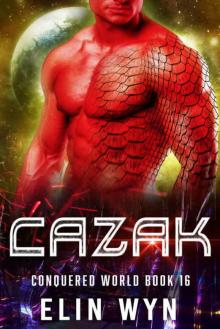 Cazak
Cazak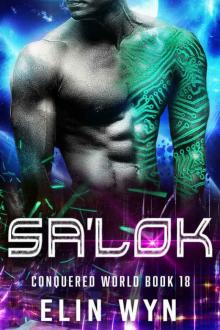 Sa'lok
Sa'lok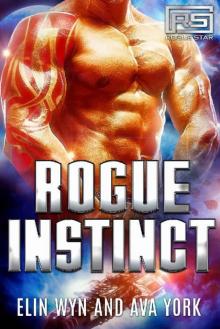 Rogue Instinct
Rogue Instinct The Alien Reindeer's Redemption
The Alien Reindeer's Redemption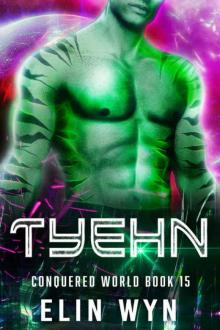 Tyehn
Tyehn Rokul
Rokul Rouhr
Rouhr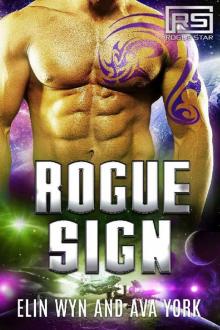 Rogue Sign
Rogue Sign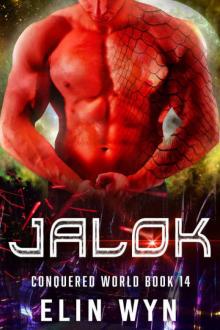 Jalok
Jalok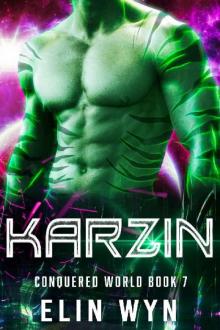 Karzin
Karzin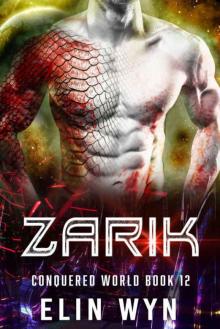 Zarik
Zarik Sk'lar
Sk'lar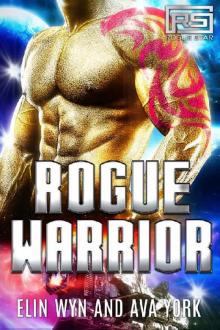 Rogue Warrior
Rogue Warrior The Gate Jumpers Saga: Science Fiction Romance Collection
The Gate Jumpers Saga: Science Fiction Romance Collection Vrehx's Quest
Vrehx's Quest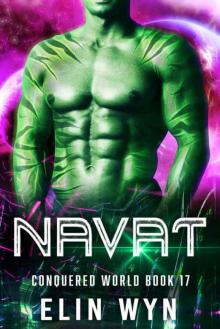 Navat
Navat Given to the Wolf (The Wolves of the Daedalus Book 1)
Given to the Wolf (The Wolves of the Daedalus Book 1)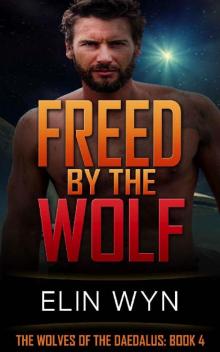 Freed by the Wolf
Freed by the Wolf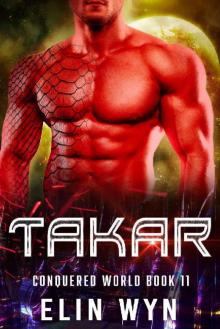 Takar
Takar Given
Given Caged with the Wolf (The Wolves of the Daedalus Book 3)
Caged with the Wolf (The Wolves of the Daedalus Book 3) Snared_A Science Fiction Adventure Romance
Snared_A Science Fiction Adventure Romance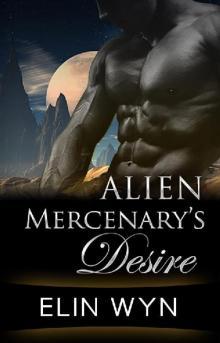 Alien Mercenary's Desire
Alien Mercenary's Desire Island Stars
Island Stars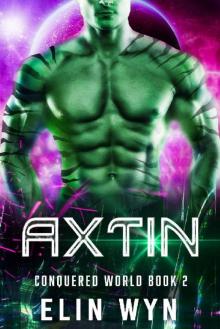 Axtin: A Science Fiction Adventure Romance (Conquered World Book 2)
Axtin: A Science Fiction Adventure Romance (Conquered World Book 2) Craved_A Science Fiction Adventure Romance
Craved_A Science Fiction Adventure Romance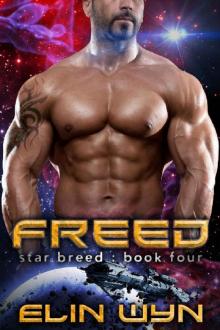 Freed
Freed Snared
Snared Craved
Craved